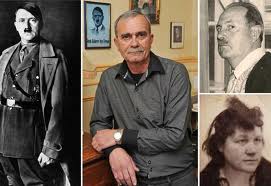Philippe Loret and his six siblings were sitting around the dining room table chatting about everyday things when their father, Jean-Marie, broke the news.
“Suddenly my father said, ‘Kids, I’ve got something to tell you. Your grandfather is Adolf Hitler’, ” explains Philippe.
“There was stunned silence as no one knew what to say. We didn’t know how to react.”
That was 40 years ago, yet there is a sense that Philippe, 56, still doesn’t know how to react.

A former plumber for the French air force, he has kept it a secret from all but his closest friends, never telling his colleagues or even his partner’s family.
This is the first time Philippe has talked publicly about his ancestry and he has agreed to do so only in the light of new evidence backing up his father’s story.
The story of Hitler’s secret lovechild has divided historians for decades.
Jean-Marie died in 1985, aged 67, but two months ago, in Paris’s Le Point magazine, his lawyer, Francois Gibault, revealed compelling evidence to support his claims.
Tests prove Jean-Marie had the same blood type as Hitler and similar handwriting.
Hitler had no official children and never acknowledged or met Jean-Marie.
But German army papers show that officers took envelopes of cash to Charlotte during the Second World War.
When she died, Jean-Marie found paintings in her attic signed by Hitler, while in Germany a picture of a woman painted by Hitler looked exactly like Charlotte.
Most striking of all, however, was the astonishing resemblance…a resemblance that Philippe undoubtedly shares.
It is there in the familiar dimpled chin, the square jaw and piercing eyes.
Philippe insists he is not proud of his apparent link to Hitler, but admits he is not unhappy about it either.
There is something vaguely unsettling about the way he sweeps his hair into the same side parting and has a moustache, something most people would avoid were they said to be related to Hitler.
And on entering his spacious one-bedroom flat in the sleepy town of Saint-Quentin in Picardy, northern France, one’s eyes are inevitably drawn to two portraits of the Fuhrer on the wall, incongruously placed either side of an oil painting of a vase of flowers.
In all other respects, the flat is cosy, with warm yellow walls and antique furniture. Philippe’s partner, Veronique, 46, a school caretaker, bustles around, chatting and making pots of tea. They met shortly after Philippe’s wife, Rosalyn, died in 1991; they had three children.
Veronique clearly adores Philippe, who is currently off work with a heart condition, and says the fact he may be Hitler’s grandson makes no difference at all. She, like Philippe, believes the claims are true.
For his part, Philippe remains strangely unperturbed by the fact he could be a direct descendant of the man responsible for the death camps and the Holocaust.
Speaking calmly and quietly, while chain-smoking Belgian cigars, Philippe says: “I believe I am Hitler’s grandson. Of course I am. The evidence is there. If people don’t believe it, that’s their problem.
“My father told me. My mother is still alive and also believes it. He is part of my family, that’s why I have him on the wall. Hitler is my family. It’s not my fault that I ended up as his grandson or that all the things happened during the war. What he did has nothing to do with me. He will always be family for me.
“When I was first told, all I was interested in was girls, and so I didn’t think about it too much. I knew who Hitler was – I studied him at school – but I did not tell any of my school friends. My private life had nothing to do with them.
“I married Rosalyn in 1977 when she was 19 and I was 21. She did not want to accept it at first, but then she became used to it. Veronique first found it difficult to accept too, but she does not mind it because she loves me.’
In contrast to Philippe’s sanguine approach – he has read more than 40 books on Hitler, met the daughter of Himmler and claims to have spoken to one of the dictator’s mistresses – Jean-Marie struggled with the knowledge left to him by his mother.
Philippe says: “By the time my father told us about Hitler being his father, he was proud of being Hitler’s son. He had trouble accepting it at first. He didn’t like this fact, but gradually he came to terms with it.”
In 1981 Jean-Marie wrote a book, Your Father’s Name Was Hitler, in which he recounted the story his mother had told him when he was in his 20s. Charlotte said he had been conceived during a “tipsy” evening with Hitler in June 1917.
She said she had enjoyed a brief relationship with the Fuhrer when he was on leave in the town of Fournes-in-Weppe near Lille. It was an unlikely match. She was 16, Hitler was 28; he couldn’t speak French, she couldn’t speak German.
The couple would go walking but Charlotte told Jean-Marie: “These walks usually ended badly. In fact, your father, inspired by nature, launched into speeches which I did not really understand. He did not speak French, but ranted in German, talking to an imaginary audience.
by Mike Hansom

